As the first snows of December drift across my South St Louis windows, and the last shards of Thanksgiving turkey find their way into the requisite casseroles, cold cuts, and cauldrons of stock, I find myself harkening back to early Advent Sundays of yore.
My childhood, like so many others, was loaded with the humor of the holidays, but one of my family’s favorite traditions always tended in a more marsupial direction. So if you’ve got some time between mixing tubs of “Tom and Jerry” and trimming the tree, I’d like to share one of many meaningful excursions through the absurd quadrants of kiddie Christmas culture.
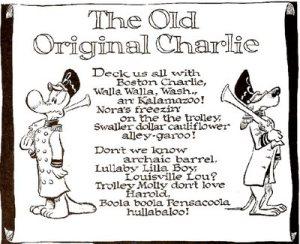
As I boy growing up in Detroit in the 1970s, I loved watching my mother collapse the last of her gargantuan Thanksgiving feast into a few impossibly crammed Tupperware containers and stuff the serving platters, gravy boats, and silver-plate cutlery away for their long sleep through the seasons until the following November.
While my father wrestled with the Christmas tree and cursed our cat as it grinned Cheshire-style from the upper branches, my mother would softly sing carols to herself or hum along to the holiday classics on the kitchen radio. My family loved Christmas for many reasons – togetherness, food, faith, and even frantic shopping – but mostly we adored the way it gave rise to an unusual number of opportunities for great stories and copious laughter. Those post-Thanksgiving radio carols were our first inklings that more manic Christmas cheer would soon come rolling in on an eggnog tsunami of tinsel, gingerbread, Grinches, and Good Old Charlie Brown holiday specials.
Every year, though, one particular tune ran a bit askew of the more traditional standards. My mother was hardly a musical person. She could never carry a tune and she famously celebrated the destruction of our family piano, relishing the thought that she had saved her son from the miserable lessons she detested as child. Yet, she loved Christmas music of all stripes, and one particularly eclectic ditty above all else.
Whenever any rendition of “Deck the Halls” announced itself, my mother would stop and a sharp glint of merry mischief would twinkle in her eyes. Then she would sing lightly and blithely to herself, “Deck us all with Boston Charlie, Walla Walla, Washington, and Kalamazoo! / Nora’s freezin’ on the trolley, Swaller dollar cauliflower alley’garoo! / Don’t we know archaic barrel, Lullaby lilla boy, Louisville Lou? /Trolley Molly don’t love Harold, Boola boola Pensacoola hullabaloo!”
No, my mom was never musical, but she was a life-long Pogophile. Born too early for the great midcentury Baby Boom that zealously embraced Pogo’s zesty message of optimistic integrity and community activism, she was still raised with Walt Kelly’s Pogo Possum in all of his many incarnations. Though I never saw her read a scrap of Pogo, by the time I came along she had truly absorbed the essence of Kelly’s animal satires, songs, and sayings. As I grew up, she continually recalled a childhood crammed with Kelly’s comics as well as her adolescent fascination with the now iconic Simon & Schuster paperback collections of his work. Even in her later years, her affection for the wry little opossum’s generosity and ingenuity never wavered. Though her adoration of Pogo and his Okefenokee pals lasted the whole year round, it was especially ebullient at Christmas time and probably most recognizable whenever she savored her chance to undermine the monotonous “Fa-la-las” of “Deck the Halls” with Kelly’s more ridiculously joyous verses.
Those first galloping lines of “Deck Us All with Boston Charlie” introduce its slippery subversion of the 18th Century Welsh mummers’ melody. The following pastiche assembles random scraps of goofy geography intermeshed with foreign vocabulary to describe sing-song vignettes of screwball romance and slapstick frolic involving hilariously half-baked characters like Trolley Molly and Donkey Bunny. There are parodic traces of World War I AEF standards like “Hinky Dinky Parlez-Vous” as well as Shakespearean snippets like “Bubble Bubble, Toil and Trouble,” not to mention amusingly allusions to mass transit, wild animal calls, and a somewhat disconcerting variety of healthful foods including whole grains, melon fruits, and multiple vegetables. Most importantly, “Deck Us All” emphasizes its own bogus status as deliriously happy nonsense, hokum, and bug-a-boo with continual references to “hunky dory” folly and “harum scarum” inanity. The song barks, literally, with the same zealous delight that probably inspired those original redundant “Fa-la-la’s.” In fact, Kelly’s more eclectically composed, seemingly spontaneous assemblage fills the heart with a contemporary corollary to the anarchic Christmas revelries that probably rampaged through early medieval festivals of misrule, disorder, and disdain for the bleak midwinter and its fearful cold, darkness, and hunger. Perhaps that’s why the cantaloupe and cauliflower show up, after all?
I admit that I inherited my Mother’s appreciation for the unusual, the outré, and the slyly subversive. Even today, I cannot get through a straight version of “Deck the Halls” without exploding into Kelly’s joyfully corruptions: “Bark us all bow-wows of folly, Double-bubble, toyland trouble! Woof, Woof, Woof! Tizzy seas on melon collie! Dibble-dabble, scribble-scrabble! Goof, Goof, Goof!” It strikes me, so many years later, that Kelly might have been the first to musically exploit the cantakerous Derridean energies of “melon collie,” decades before the Smashing Pumpkins attempted their more blatantly pouty Mellon Collie and the Infinite Sadness. It matters not, though. For me, “Mellon Collie” and “Trolley Molly” and “Chilly Filly” are forever attached to my family’s life-long infatuation with America’s greatest marsupial humorist.
Its worth remembering that our Pogophilia was not unique. For most of the second half of the 20th century, Walt Kelly’s Pogo lived three lives as a staple of newspaper comic-strip satire; a reasonably successful feature in several long-running Dell series including Animal Comics, Four Color Comics, and Our Gang Comics, and lastly, as the primary “political animal” in Kelly’s unfettered sequence of more than 40 soft cover graphic novels from Simon and Schuster. These texts recapitulated the newspaper material in extended, often uncensored form, and generally expanded the scope and variety of Kelly’s anthropomorphic comedy with raucous new material.
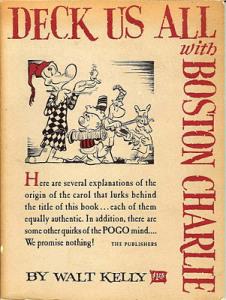
Many editions, like 1948’s The G.O. Fizzickle Pogo and 1963’s Deck Us All With Boston Charlie included seasonal or holiday themes, but every one of them exploded with rich dollops of nonsensical wordplay, cunning caricature, and excoriating visual parody. The 1963 Deck Us All volume yields predominantly Christmas-driven humor, including Howland Owl’s mock academic exploration of the many possible origins and variations of “Deck Us All With Boston Charlie,” or as he formalizes it, D.U.A.W.B.C. His incisive scholarship, which is continually interrupted by a modish Chuchy LaFemme in goatee and beret, requires the deciphering of substantial “cariogyphics” and deft applications of politically shrewd “pootluck theory.” The search for the pointless truth behind D.U.A.W.B.C takes up more than half of the compilation, and the song itself eventually evolving into an even more elusive and feral hybrid, “Bark Us All Bow-Wows of Folly, or, as Howland attempts to label it, “B.U.A.B.W.O.F.” Eventually, Kelly’s critters become bored with the search and decide to just enjoy actually singing whatever version is handy. Thus, the cycle of lunacy culminates in a finale of “Xmas Postludicrosity,” wherein Kelly’s characters celebrate what really matters about the carol, and the Holidays, and scholarship for that matter: the gosh darn fun of it all! In some ways then, “Deck Us All” becomes a kind of freeform jazz caricature, and that energy definitely informs its most famous and successful professional recording by Dave Lambert, Jon Hendricks, and Annie Ross from the fusion-inspired 1985 Jingle Bell Jazz anthology.
Like most installments of Pogo’s quirky comedy, the “Deck Us All” episodes reveal how meticulously Kelly debunked the pomposity of language with his keen ear for the humorous potential of particular cadences, dialects, and expressions. Little wonder then, that Pogo’s sing-song treatment of “Step Mother Goose” stories and corrupted carols would inspire the bango-banging lp, Songs of the Pogo in 1956 with Kelly himself sitting in, as well as a hardcover musical treasury featuring illustrated sheet music to many fitful favorites including “Deck Us All With Boston Charlie.” Before focusing on Pogo, Kelly had toiled at Disney and Dell concocting innocuous stories for oversized holiday specials like Walt Disney’s Christmas Stocking, Santa Claus Funnies, Christmas Parade, Christmas with Mother Goose, and Fairy Tale Comics, among many others. Much like his inspiration, Lewis Carroll, Kelly’s fractured fairytales and malicious melodies were every bit as wickedly perverse and shrewdly subversive as Alice’s own madcap recitations of “Twinkle Twinkle, Little Bat” or “How Doth the Little Crocodile” while under the influence of Carroll’s Wonderland logic. Kelly loved the imaginative whimsy and carefree spirit of fairytales, nursery rhymes, and holidays. His jolly Pogo cast even paraded across the cover of the December 26, 1955 Newsweek in a cheery wreath pattern to celebrate how “America sings at Christmas time.”
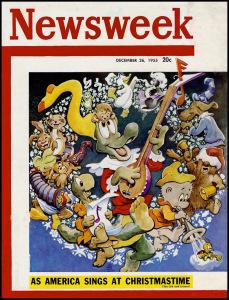
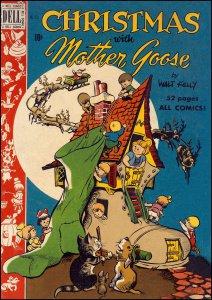
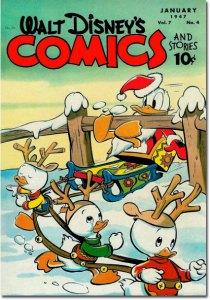
Like Carroll, though, Kelly celebrated their aggressive, rebellious, and ambivalent potential by building even more sarcastic nonsense into their frameworks. Although his folksy swamp critters embraced Christmas and other holidays with playful abandon, his crazed carols could also turn deeply satiric. Several Pogo-fried versions “The Twelve Days of Christmas” featured Albert the Alligator in extended lambasts of consumerism, while Kelly’s other favorite, carol, “God Rest You, Merry Gentleman, “became a familiar motif in the holiday installments of his comic strip reminding readers of their responsibilities towards “universal brotherhood and peace” (Andrae and Laqua 191). At the same time, original Kelly-esque Christmas traditions included the yearly ritual occurrence when “the would-be misanthrope, Porkypine, brings a flower to Pogo, the swamp crittur he ‘dislikes less than most’ “ (Andrae and Laqua 191). Original Christmas carols like “Bright Christmas Land” celebrate “Frolicking, rollicking heavens” of “love” while other screwball confabulations of existing carols included, “Good King Sauerkraut, Look Out! On yo’ feets uneven. While the snoo lay roun’ about, all kerchoo achievin’.” This last example also emphasizes Kelly’s hefty use of regional and ethnic dialects, especially those tied to rural Southern and African American speech.
Kelly’s work – visual, musical, and political- was always alive with the vibrancy of ethnic caricature and colloquial language. Some recent scholarship on Pogo has finally begun to unpack and explore the rich veins of linguistic satire that surge throughout his humor. Like George Herriman’s iconoclastic Krazy Kat, Kelly’s complex amalgamation of animal fable, nonsensical scenarios, and political commentary “channeled black identities and dialects developed from largely stereotypical and naive borrowings to more original and politically progressive fusions” that matched the increasing satiric complexity of his work over time(Soper 140). There are no adamantly ethnic portions of “Deck Us All with Boston Charlie,” but the bouncy cadences of its strange lingo are rooted in standardized American pronunciations, or mispronunciations of Native American speech patterns, tribal names, and locations like Walla Walla, and Kalamazoo are indicative of his keen exploitation of the humorous absurdities of very real and chaotic clashes between different ethnic groups and regional cultures. Incidentally, it’s worth noting that the inherently repetitive silliness of Walla Walla, Washington was also mined for comedic effect occasionally by Warner Brothers’ Daffy Duck and that the otherwise nondescript Michigan city, became famously amusing thanks to Glenn Miller’s 1942 #1 hit recording of the Gordon and Warren novelty song, “I’ve Got a Girl in Kalamazoo.” Squeezing them both, along with dozens of other sonic smart bombs, into an emphatically overloaded hymn to holiday hoopla just amplifies the revelry of ridiculousness even further.
Amidst all of the patented glamour and kitsch of the 21st century postmodern American Christmas, encouragingly assertive and playfully impromptu holiday nonsense like Kelly’s cacophonous cocktail of a carol becomes more vibrant and valuable than ever. Acknowledging the immense cultural inertia of the winter Holidays, “Deck Us All” remains a remarkably potent, undeniably catchy, and, for me at least, a provocatively personal testament to maternal memories of merry-making, mischief, and make believe. Every year, it continues to “Deck Us All” with the truly compelling chaos of Xmas Ludicrosity.
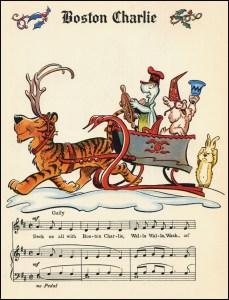
References
Andrae, Thomas and Carsten Laqua. Walt Kelly: The Life and Art of the Creator of Pogo. New Castle, PA:Hermes Press, 2012. Print.
Soper, Kerry. We Go Pogo: Walt Kelly, Politics, and American Satire. Jackson, MS: U of Mississippi Press, 2012. Print.
